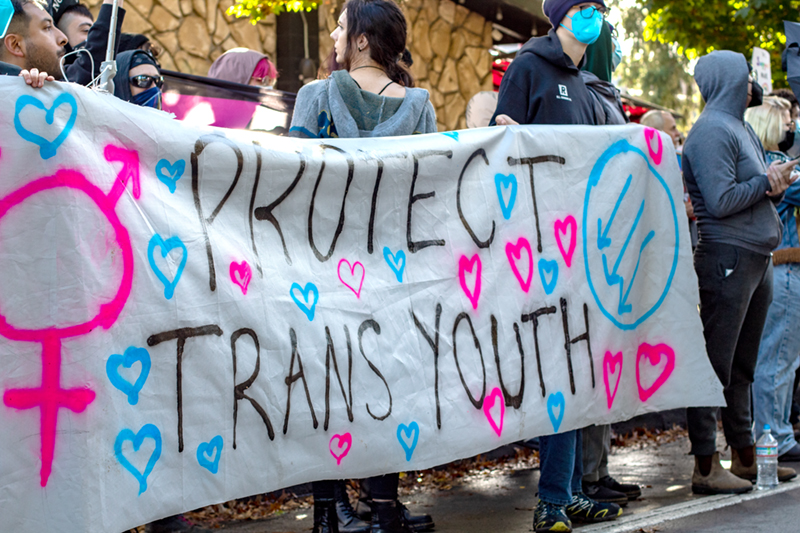Iowa court finds Medicaid ban on transgender surgery is unconstitutional
Ban violates both Iowa Civil Rights Act and Iowa Constitution's guarantee of equal protection for all residents
By John Riley on June 7, 2018 @JRileyMW

An Iowa court has determined that the state’s ban on Medicaid coverage for medically necessary surgical care for transgender residents is unconstitutional.
Chief District Judge Arthur E. Gamble of the Des Moines-based Fifth Judicial District of Iowa found that the Iowa Department of Human Services’ ban on surgical coverage violates both the Iowa Civil Rights Act and the state’s constitution. In his opinion, Gamble ordered DHS to immediately approve the women’s request for pre-approval of coverage under Medicaid.
Both women, Carol Ann Beal, 42, of northwest Iowa, and EerieAnna Good, 27, of the Quad Cities, have been diagnosed with gender dysphoria and legally changed their names, and had their birth certificates, driver’s licenses, and Social Security cards changed to reflect their correct names and gender identity. Both women also began hormone therapy, and were advised by their doctors to pursue surgery for treatment of their gender dysphoria.
Iowa’s DHS office rejected both women’s requests for coverage, citing the ban. Afterwards, the women enlisted the help of the American Civil Liberties Union and ACLU of Iowa, and sued, arguing that the ban was unconstitutional.
Lawyers from the ACLU and ACLU of Iowa pointed out that Medicaid otherwise provides coverage for medically necessary surgeries utilized by transgender people, that would normally be covered had the individual in question been cisgender. Gamble echoed this in his opinion.
“DHS does not explain why the medical necessity of requests for sex reassignment surgeries could not simply be evaluated under the same criteria as other requested surgeries or treatment of non-transgender individuals,” he writes. “Petitioners have provided clear medical documentation outlining the medical necessity of their requested procedures. Thus, the Court sees no reason why DHS and the MCOs need an additional and indefinite period of time to develop new and separate criteria for evaluating requests by transgender individuals as opposed to simply applying the existing criteria.”
“Today’s decision is historic for civil rights in Iowa, because it recognizes for the first time in a court decision what we’ve long known, that transgender Iowans are protected by the Iowa Constitution’s guarantee of equal protection, as well as by the Iowa Civil Rights Act,” Rita Bettis, the legal director of the ACLU of Iowa, said in a statement.
“We are so relieved for our brave clients that they can finally get the gender confirming surgical care that all their doctors agree is medically necessary for them,” Bettis added. “We are honored to represent them in their long journey for themselves and for all other transgender Iowans to be treated equally and
fairly under the law.”
In 2014, the U.S. Department of Health and Human Services invalidated its ban on Medicare coverage for surgery and other transition-related care. Since then, several states have begun eliminating their state Medicaid bans on transition-related surgery, and individuals in other states, including Minnesota and Wisconsin, have sued their state health departments to eliminate the Medicaid exclusion.
“The court has brought Iowa in line with the current understanding of the critical needs for transgender people,” John A. Knight, a senior staff attorney with the national ACLU, said in a statement. “By recognizing and rejecting the historic discrimination faced by transgender people, the court is opening the door to the life-saving medical care and necessary gender-affirming treatment that transgender people are too often denied.”
The court found that when the Medicaid ban was first implemented more than two decades ago, much less was known about gender dysphoria, and gender identity was not protected under the Iowa Civil Rights Act. Gender identity (as well as sexual orientation) has since been added as a protected class, and the Iowa Constitution guarantees equal protection for all Iowa residents, regardless of characteristics that are covered in the Civil Rights Act. Therefore, the court had no choice but to find the ban unconstitutional.
“We are thrilled that our state’s unconstitutional ban on transition-related surgical care has been struck down,” Daniel Hoffman Zinnel, the executive director of LGBTQ rights organization One Iowa, said in a statement. “Through our work with transgender Iowans, we have seen firsthand how powerful, life-changing, and absolutely essential gender-affirming surgery can be for transgender people grappling with gender dysphoria. This decision will, quite literally, save lives.”
“This has been a long time coming,” Beal said in a statement. “I’m so glad I can get the care I need, and I’m glad that other Iowans can now get the same care. Transition-related care is a medical issue, plain and simple. It’s like any other surgery that a doctor would recommend for you or a family member. Public or private insurance would pay for it, and you’d just do it and move ahead with your life.
“I look forward to the day when someone fighting to get the transition-related medical care they need isn’t in the news because they had to go to court to fight for it. But I’m doing it because someone needs to be the trailblazer here,” she added. “I want to make it easier for the younger people who need this surgery, so they don’t have to go through the struggles I have had to go through.”
More from Metro Weekly:
Judge Blocks Georgia Ban on Gender-Affirming Care
A federal judge has blocked Georgia state and prison authorities from denying hormone therapy to transgender prisoners.
By John Riley on December 6, 2025 @JRileyMW
Federal Judge Victoria Calvert has permanently blocked a portion of Georgia’s law banning prisoners from receiving gender-affirming care, ruling on Dec. 3 that the state’s blanket ban on hormone therapy violates the Eighth Amendment’s prohibition on cruel and unusual punishment.
Signed by Gov. Brian Kemp in May and implemented in July, the law bars prisoners from receiving hormone therapy or other treatment for gender dysphoria -- even when a doctor deems it medically necessary. It prohibits the state from funding such care and blocks transgender inmates from paying for it themselves. Non-transgender prisoners, however, may still receive hormone therapy and other gender-affirming treatments so long as the care is not related to gender transition.
Barry Manilow Reveals Lung Cancer Diagnosis
The 82-year-old says the cancer was caught early, surgery is planned, and no chemo or radiation is expected.
By John Riley on December 23, 2025 @JRileyMW
Barry Manilow announced in an Instagram post that he has lung cancer.
"As many of you know, I recently went through six weeks of bronchitis followed by a relapse of another five weeks," wrote the 82-year-old singer-songwriter. "Even though I was over the bronchitis and back on stage at the Westgate Las Vegas, my wonderful doctor ordered an MRI just to make sure that everything was OK. The MRI discovered a cancerous spot on my left lung that needs to be removed.
"It's pure luck (and a great doctor) that it was found so early," Manilow continued. "That's the good news."
HHS Moves to Cut Off Trans Youth Health Care
The Trump administration is proposing rules that would strip hospitals of federal funding for providing transition-related care to minors.
By John Riley on December 19, 2025 @JRileyMW
The Trump administration has proposed two federal rules that would restrict access to gender-affirming care for transgender minors nationwide.
The proposed regulations, issued by the U.S. Department of Health and Human Services' Centers for Medicare and Medicaid Services (CMS), would bar federal Medicaid funds from covering transition-related care for transgender youth under 19 and threaten to strip federal funding from hospitals that provide gender-affirming treatments to minors.
HHS officials told NBC News that CMS will begin the federal rule-making process with a 60-day public comment period, after which the rules could be finalized.
Support Metro Weekly’s Journalism
These are challenging times for news organizations. And yet it’s crucial we stay active and provide vital resources and information to both our local readers and the world. So won’t you please take a moment and consider supporting Metro Weekly with a membership? For as little as $5 a month, you can help ensure Metro Weekly magazine and MetroWeekly.com remain free, viable resources as we provide the best, most diverse, culturally-resonant LGBTQ coverage in both the D.C. region and around the world. Memberships come with exclusive perks and discounts, your own personal digital delivery of each week’s magazine (and an archive), access to our Member's Lounge when it launches this fall, and exclusive members-only items like Metro Weekly Membership Mugs and Tote Bags! Check out all our membership levels here and please join us today!
The Magazine
-
Most Popular
 Burglary Suspect Arrested After Molesting, Urinating on Victim
Burglary Suspect Arrested After Molesting, Urinating on Victim  Three LGBTQ Players Join U.S. Women’s Olympic Hockey Team
Three LGBTQ Players Join U.S. Women’s Olympic Hockey Team  Louisiana Man Charged With Extorting LSU Student Into Sex
Louisiana Man Charged With Extorting LSU Student Into Sex  Stranger Things Creators Address Coming-Out Backlash
Stranger Things Creators Address Coming-Out Backlash  Trans Woman Sues Hilton Over Alleged Assault by Security Guard
Trans Woman Sues Hilton Over Alleged Assault by Security Guard  Wisconsin Man Accused of Using Grindr in Catfish Scheme
Wisconsin Man Accused of Using Grindr in Catfish Scheme  Marjorie Prime Outmatches Chess on Broadway
Marjorie Prime Outmatches Chess on Broadway  Anti-Gay Ohio Pastor Charged With Child Sexual Abuse
Anti-Gay Ohio Pastor Charged With Child Sexual Abuse  Florida Man Tried To Run Down LGBTQ Runners in SUV
Florida Man Tried To Run Down LGBTQ Runners in SUV  Marty Supreme Runs on Timothée Chalamet’s Pure Mania
Marty Supreme Runs on Timothée Chalamet’s Pure Mania
 Stranger Things Creators Address Coming-Out Backlash
Stranger Things Creators Address Coming-Out Backlash  Three LGBTQ Players Join U.S. Women’s Olympic Hockey Team
Three LGBTQ Players Join U.S. Women’s Olympic Hockey Team  Burglary Suspect Arrested After Molesting, Urinating on Victim
Burglary Suspect Arrested After Molesting, Urinating on Victim  10 Guilty of Cyberbullying Brigitte Macron Over Trans Rumors
10 Guilty of Cyberbullying Brigitte Macron Over Trans Rumors  Marty Supreme Runs on Timothée Chalamet’s Pure Mania
Marty Supreme Runs on Timothée Chalamet’s Pure Mania  Marjorie Prime Outmatches Chess on Broadway
Marjorie Prime Outmatches Chess on Broadway  Light Up’s Voices Are Powerful. Its Format Is Not.
Light Up’s Voices Are Powerful. Its Format Is Not.  UK to Allow Same-Sex Ice Dance Pairs at National Events
UK to Allow Same-Sex Ice Dance Pairs at National Events  Terry Sweeney Slams Chevy Chase Over Alleged AIDS Joke
Terry Sweeney Slams Chevy Chase Over Alleged AIDS Joke  Departing NYC Mayor Eric Adams Announces $2 Million for Trans Groups
Departing NYC Mayor Eric Adams Announces $2 Million for Trans Groups
Scene
Metro Weekly
Washington's LGBTQ Magazine
P.O. Box 11559
Washington, DC 20008 (202) 527-9624
About Us pageFollow Us:
· Facebook
· Twitter
· Flipboard
· YouTube
· Instagram
· RSS News | RSS SceneArchives
Copyright ©2025 Jansi LLC.














You must be logged in to post a comment.